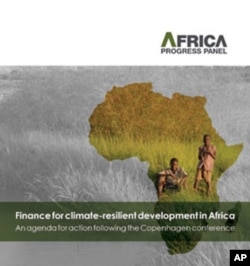A new report says if Africa is going to adapt to climate change, donor countries must honor their pledge to help pay for it.
The Africa Progress Panel report, Finance for Climate-Resilient Development in Africa, is called a road map leading to the U.N. Climate Change Conference (COP16) in Cancun in December. The panel is chaired by former U.N. Secretary-General Kofi Annan.
Last year’s Copenhagen Accord calls on developed countries to provide (US) $100-billion for climate change adaptation and mitigation for developing countries by 2020.
Guido Schmidt-Traub, climate change advisor to the panel, is attending the Africa Energy Forum in Basel, Switzerland, where the report was released Wednesday.
“The main message is that responding to climate change and development are really two sides of the same coin. And they need to be looked at together,” he says.
“The tools are known to address the challenges…of adaptation and mitigation and of course development. What is lacking in many places now is financing.”
Follow through
Donors are “far behind” in fulfilling their funding commitments, according to Schmidt-Traub.
“On the development side it’s basically a glass that’s half full. We have about 60 percent of the total financing that has been committed. On the climate change side, it’s early to tell because the promises were made in Copenhagen (last December). But so far the signs are not very positive,” he says.
The report says only a small amount of the money being allocated for climate change is going to Africa.
Adapting, mitigating. What’s it all about?
“That’s a very good question. When people think (about) adapting to climate change, they often think first and foremost of higher sea walls to protect against floods. Now, some seawalls will need to be built in Africa, but it really is only a very small share,” he says.
There are bigger problems to address. For example, he says, “More places in Africa will need malaria bed nets because malaria’s going to reach areas that currently are not touched.” A British study last year warned that rising temperatures allows malaria to move into higher altitude areas, where it didn’t exist before. One example is Mount Kenya, where more people are now at risk of malaria due to increasing temperatures.
Also, the report says investment is needed for water management infrastructure.
“The place (Africa) is going to get drier. In many places, rainfall will become more erratic. Energy infrastructure needs to be re-thought. What they require now is scaling up and that, of course, critically requires more resources,” he says.
Advanced emerging economies
While the Africa Progress Panel calls on developed countries to meet their funding pledges, it also says advanced emerging economies must play a role. These include Brazil, South Africa, India and China. These countries not only have greater energy needs, but also higher per capita incomes and per capita greenhouse gas emissions.
“Over time,” says Schmidt-Traub, “it is clear that there can be no sustainable climate unless the advanced emerging economies also do their share of reducing greenhouse gas emissions. The first step, though, must be taken by rich economies. Africa will need more financing over a longer period of time.”
What if
If the funding fails to come through on time, what then? The climate change adviser says, “The predictions are not very positive for Africa. Africa has contributed the least to climate change, but it is expected to be hit the hardest by the consequences of climate change.”
Those consequences may include a decline in agricultural production in many areas. That could trigger a migration from rural regions to African cities and to countries outside the continent.
“You’re going to see further reduced economic growth prospects. The climate challenge is going to compound what already is a very difficult development challenge,” he says.
Schmidt-Traub doubts there’ll be a binding global agreement on climate at COP16.
“That is an unrealistic expectation for Cancun,” he says. “What Cancun should do is take the various pieces where significant progress was made at the last meeting in Copenhagen and turn them into practices. It includes chiefly financing. This of course also must include more binding and stricter commitments to mitigate greenhouse gas emissions, to reduce greenhouse gas emissions in rich countries.”
He says an agreement should also be made with advanced emerging economies on what role they will play.
Members of the Africa Progress panel include former British Prime Minister Tony Blair, former Nigerian President Olusegun Obasanjo and Nobel Laureate Muhammad Yunus, among others.




